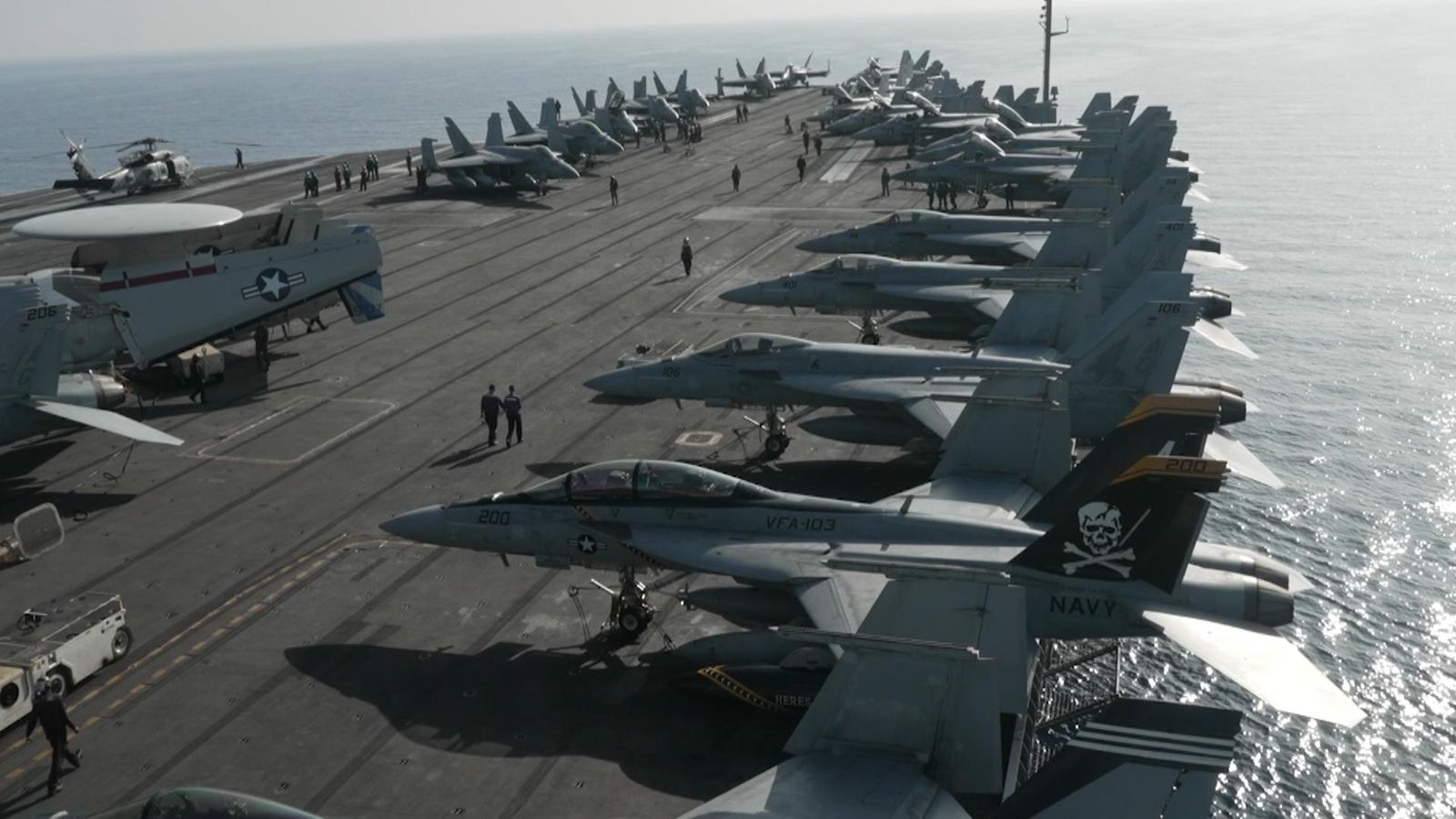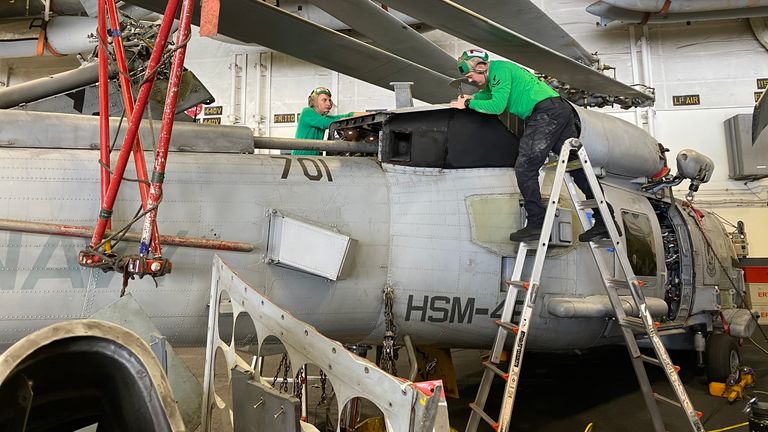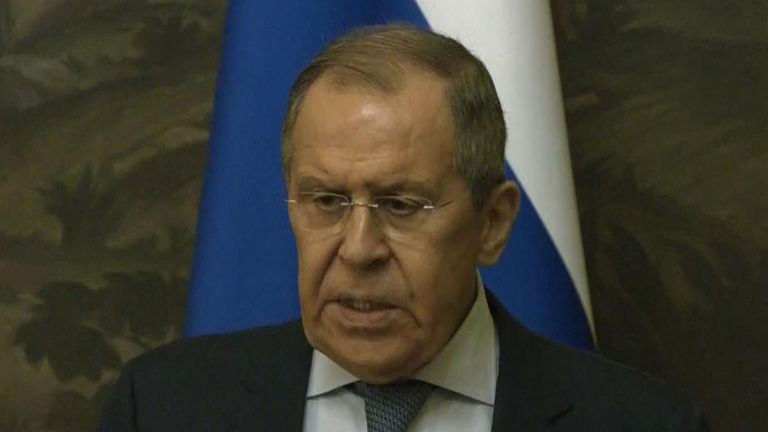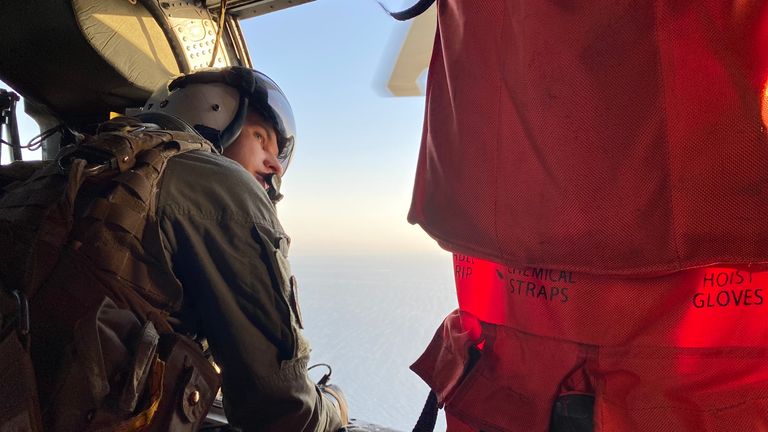The crew of a giant US aircraft carrier in European waters says they are ready to fight Russia if the call comes but their mission is to deter threats and prevent escalation.
The USS George H W Bush is helping to test NATO’s ability to defend itself – a mission that became all the more real in the wake of Russia’s war in Ukraine.
In the past few days, F18 jets have flown from the carrier in southern Europe all the way out to Lithuania and Poland on the alliance’s eastern edge, close to Russia, operating alongside warplanes from other allied nations and with NATO warships and ground troops.
The commander of the carrier strike group told Sky News his message to Russia is that his men and women “are ready for any mission”.
“We want peace – it’s what everybody wants,” Rear Admiral Dennis Velez said, speaking inside a hangar on board the ship, which holds more than 70 jets, helicopters and other aircraft.
“We want the war [in Ukraine] to be over and to bring stability back to the region and have a peaceful and stable Europe – but, for us, we are ready.”
Asked if that meant he was ready for war if necessary, the admiral said: “This ship, this strike group, our allies: we are ready for anything. We demonstrate that every day.”
At least two Russian warships have been watching the action, which forms part of a series of NATO activities, from a safe distance, as have Russian aircraft.
“We have seen them,” said Rear Admiral Velez, speaking on Tuesday as the strike group of the aircraft carrier and escort ships sailed through the Adriatic Sea, off the coast of Italy.
As to what was said to the Russians, he answered: “Nothing… They have the same right as we do to operate in international waters, so we just follow international law and the rules of the road.”
The vicinity of Russia’s military and the knowledge that Russian forces are locked in a brutal war with Ukraine – which is not part of NATO but shares borders with members of the alliance – means operating in Europe is no longer just another peacetime training exercise for the more than 5,000-strong crew of US sailors on the carrier.
“It is a real change,” said Lieutenant Cordan Mackenzie, 27, one of the F18 pilots on board. Her call sign is ‘Big Poppa’.
“Most of the time what we are doing, it feels like training, it feels like a game but you come out here and have intel [intelligence] briefings and you fly missions with NATO allies and it really solidifies how real the things that we do in the world are and how important our mission set is: having a presence here in the Adriatic and having the US work with our NATO allies to make sure the world knows we are still a power to be reckoned with.”
She, and her fellow aviators, face the possibility of one day being ordered to fight in air-to-air combat against the Russians should tensions escalate significantly.
It is a type of operation that US, British and other Western pilots did not have to contemplate during the long war in Afghanistan when they were not pitted against a rival air force.
“It is daunting,” said Lieutenant Mackenzie.
“It is one of the things that you just have to rely on your training. Without a doubt, I think US-trained navy pilots are the best in the world… All we do out here is train and get ready for a fight that might come and I think when it comes, pilot to pilot, I hope we are the better man in the box.”
The carrier is taking part in a relatively new NATO series of activities called Neptune, which – unlike longer-planned, more predictable, annual exercises – allows allies to be faster, more flexible and more dynamic with how they test their maritime, air and land capabilities.
This is designed to improve their ability to deter Russia – a task that allies have focused on even more intensely following Vladimir Putin’s all-out invasion of Ukraine on 24 February.
“We have stepped up our readiness, our preparedness and strengthened the way we work together across the alliance to prevent and defend every inch of NATO territory,” Jens Stoltenberg, the secretary general of NATO, told Sky News on a visit to the carrier.
For example, he said this was also only the third time since the end of the Cold War that a US aircraft carrier group has come under NATO command, with all three of those occasions happening as part of Neptune drills in the past year.
The NATO chief also voiced new concern about Ukraine after Russia falsely alleged the Ukrainians were planning to use a radioactive “dirty bomb” on their own territory. The claim could be part of a “false flag” plot by Moscow to launch such an attack and blame Kyiv.
Read more:
What is a ‘dirty bomb’ and is Russia planning to blow up the Nova Kakhovka dam?
“Russia has accused others of things they intend to do themselves, so we need to monitor closely what Russia now does. And they must know that use of a dirty bomb or a radiological bomb is a serious escalation,” Mr Stoltenberg said.
Asked how NATO would respond to such an attack, he said: “It will be a very serious escalation.”
Allies are also concerned that Vladimir Putin could even resort to a nuclear strike as his forces suffer defeats at the hands of Ukraine’s military, backed by Western weapons.
The head of NATO said: “The likelihood of any use of a nuclear weapon in Ukraine remains low, at the same time the consequences are so devastating, so enormous it is a risk we have to take seriously.”



